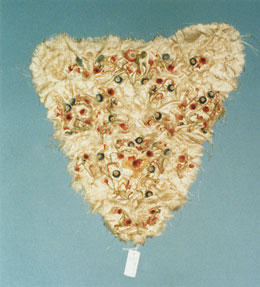 The illusion of shape is a common challenge in fashion and one of the many tools to procure this shape was the stomacher. While many people may tend to associate stomachers with the 18th century, they had been around for centuries, giving a narrow-wasted illusion to its wearer.
The illusion of shape is a common challenge in fashion and one of the many tools to procure this shape was the stomacher. While many people may tend to associate stomachers with the 18th century, they had been around for centuries, giving a narrow-wasted illusion to its wearer.Stomachers are a triangular and stiff piece of fabric that is used to connect the two sides of a gown or jack around the front. While this clothing panel may have begun as a functional implement, the 18th century gave rise to it as a fashionable piece. Robes a la francaise were known as open gowns due to the fact that they were "open" to reveal the stomacher. Stomachers could be sewn into the garment or they were attached to the reverse of the bodice and could be removed. The overall effect displayed a perfectly flat chest, for a ladies' midsection should be smooth and almost cone-like. These accoutrement's were usually lavishly adorned with embroidery, ribbons, or even fancy jewels. In the middle of the century there was a trend for rows of bows descending the stomacher, these were called en échelle or ladders. Judging by her portraits, Madame de Pompadour was quite a fan.
Here are some surviving stomachers which show just how elegant and amazing these accessories could be.

 circa 1760
circa 1760
1700-25


Delish. What do you mean about attaching to the reverse of the bodice though?
ReplyDeleteThey were attached to the bodice on the inside seam, so it looked as if it were peeking out. I knew I wouldn't explain it right!
ReplyDeletethe third one from the top is absolutely stunning! ...the one before that, not so much...
ReplyDelete<3 Thanks for the post and all the great images! the Kyoto collection never ceases to amaze me...
ReplyDeleteThis stomacher should be mandatory to all women....
ReplyDeleteOoo harsh, my dear! But I know you only speak from a love of good fashion. You know they had a brief stint on menswear...
ReplyDelete